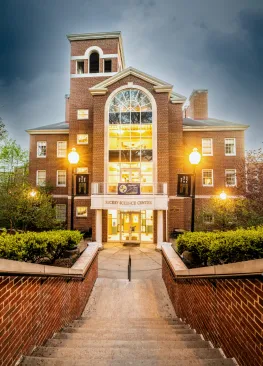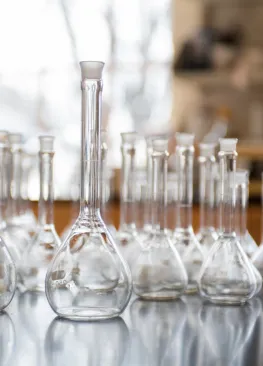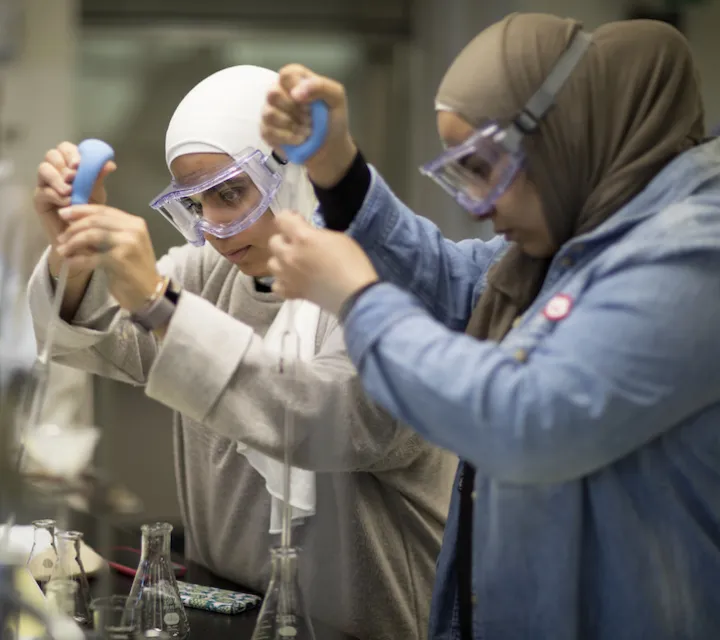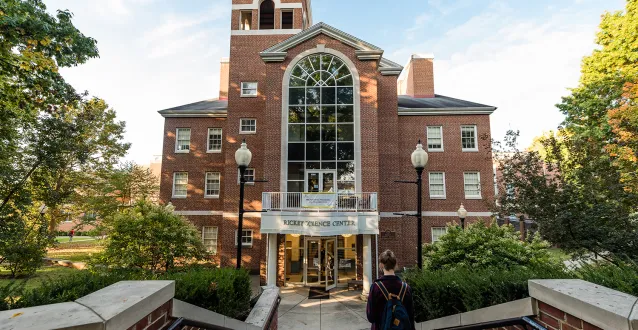Majoring in Chemistry
Natural curiosity, a desire to find solutions, and a commitment to improving the lives of others — these are just a few of the traits that Chemistry majors at Marietta College possess.
Whether the goal is to continue onto graduate school or to go directly into working in a lab, our Chemistry majors begin building their knowledge and their laboratory skillsets from the first day of class. Marietta offers an American Chemical Society-certified major and a non-ACS-certified major. Both majors challenge students with a rigorous chemistry curriculum while allowing them to also pursue their interests in other fields, including biology, physics, and mathematics.
Talented faculty — who are also respected chemists — provide leadership in the classroom and in research labs. First-year students have opportunities to conduct serious research, and all majors are encouraged to publish their work or present it during national and international conferences. During the spring, the entire campus community unites to present original research projects during All Scholars Day.




What You'll Learn
At Marietta, you will benefit from rigorous instruction in the classroom, training in a variety of labs, close relationships with expert faculty, involvement in serious research and high-level internships, and opportunities to present original research on campus and during professional conferences.
Starting as a junior, you will work with a faculty mentor who will guide you through at least one year of independent laboratory research. You will use campus laboratories equipped with the latest technology and instrumentation, including a nuclear magnetic resonance spectrometer, a Fourier-transform infrared spectrophotometer, a gas chromatograph-mass spectrometer, laser equipment, and molecular modeling software.
The Chemistry Major at Marietta College is certified by the American Chemical Society. This and the wide range of research projects offered by the department faculty provide you with the background needed to enter graduate school or obtain an industry position.
The Rickey Science Center features classrooms and research areas, including laboratories equipped with a nuclear magnetic resonance spectrometer, a Fourier-transform infrared spectrophotometer, a gas chromatograph-mass spectrometer, laser equipment, and molecular modeling software.
More Info
Whether the goal is to continue onto graduate school or to go directly into working in a lab, our Chemistry majors begin building their knowledge and their laboratory skillsets from the first day of class.
- Outcomes — Internships
- Axens
- Microbac
- University of Southern Mississippi (Research Experience for Undergraduates)
- West Virginia University (Research Experience for Undergraduates)
- Outcomes — Career Opportunities
- Polaroid, Market Development
- The Ohio State University, Associate Professor
- North State Environmental, Operations Chemist
- St. Elizabeth Medical Center, Chief of Cardiology
- St. Thomas Aquinas College, Assistant Professor of Chemistry
- Pittsburgh Paints, Formulation Chemist
- Millipore Sigma, Production Engineer
- Outcomes — Graduate Programs
- Colorado School of Mines, MA in Geochemistry
- Johns Hopkins University, Ph.D. in Chemistry
- Rice University, Ph.D. in Organic Chemistry
- Brown University, Ph.D. in Chemistry
- Pennsylvania State University, MA in Environmental Engineering
- Syracuse University, Ph.D. in Physical Chemistry
FAQs
- Can I do laboratory research as an undergraduate student?
Absolutely! All students graduating from the Department of Chemistry with a major in either chemistry or biochemistry must complete at least one year of independent laboratory research. Chemistry majors are mentored by faculty from the Department of Chemistry, while biochemistry majors may select a faculty mentor from the Department of Chemistry or the Department of Biology. Also, undergraduate research is important if you are planning to go to graduate school in chemistry.
- Does the department accept AP credit toward the major?
The department recognizes the accomplishments of students who have AP credit in chemistry. Any student who scores a 3 in AP Chemistry will get credit for CHEM 101. Any student who scores a 5 in AP Chemistry will get credit for CHEM 100 and CHEM 131/133.
- Can I double major or complete a minor in another field?
Yes, it is possible but you should understand there are serious drawbacks in doing so. Double majors must meet all of the requirements for both majors, and finding the time to do so can be difficult or impossible. Graduate schools in chemistry will be more impressed with candidates who have completed advanced work in several areas of chemistry than with someone who has completed only the minimum requirements for two majors. If you are contemplating an additional major or a minor, be sure to speak with the major adviser in both departments as early as possible.
- With whom should I speak with if I want to learn more about majoring in Chemistry?
The best and most reliable source of information about course placement and planning are the Chemistry faculty members. Of course, your fellow students have much to offer based on their own experiences, however, their advice about course requirements and placement may be incomplete or out of date. It is always best to double-check with a faculty member.






